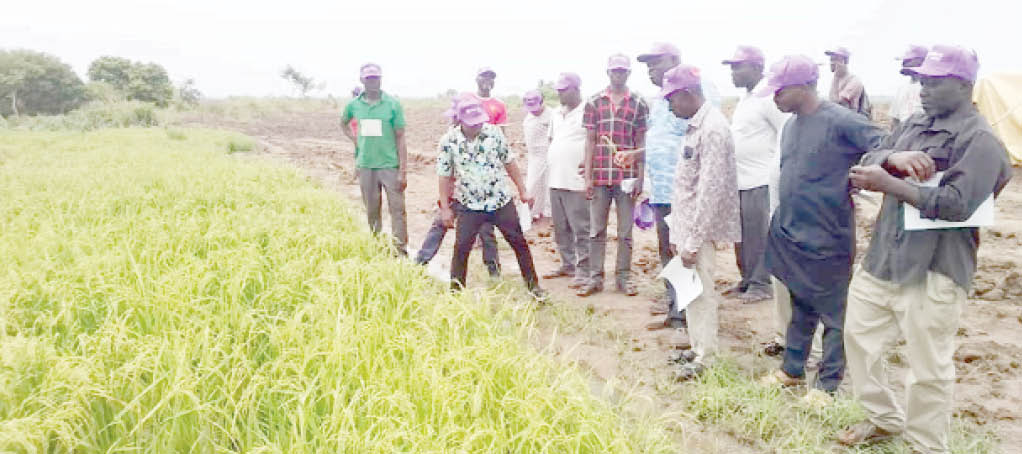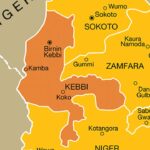Terkula Abuul is not conversant with cucumber farming despite doing well in other crop production on his farm in Benue State.
Abuul said some cucumber farms he had come across in the state were not so impressive to inform his decision about delving in that direction. “It’s (cucumber farming) not to my taste, I’m discouraged. My maize farm is however doing well,” he said.
For James Nager, cucumber farming is on his mind so long as there would be technical support to aid him with best agronomic practice for large scale production.
“The cucumber I see on the farm here (Makurdi) is nutritious and good for the body. It’s doing well. I want to venture into it but I haven’t done it before,” Nager added.
- Fraud investigation institute partners ANAN College on professionalism
- Some western news items are sinophobia
On her part, Mrs Ngunan Terna, a farmer who mainly specialise on rice and maize farming during the wet and dry seasons, opined that the need for more knowledge to enhance production as well as delve into other crops cultivation cannot be overemphasised.
The female farmer alongside Nager and Abuul were among stakeholders who recently converged on Teryima’s field at the bank of River Benue in Makurdi during its Farmers Field Day, to make their choice of different varieties of seed crops grown on the expanse of land.
Terna said that both rice and maize which she majored in are very lucrative. “Land preparation and seeds (quality) and fertilizer are mostly needed for my cropping, but the challenge is shortage of rainfall which brings about issues in controlling weed,” she added.
Bundensen Swem, another farmer who though has a small farm, works in other people’s farm including Teryimas’, however disclosed that she weeds the watermelon section of the farm.
Swem said getting farm implements was her major challenge in tackling her aspect of the farm work as women mostly do the weeding.
Our correspondent reports that the field day heralded concerns of the farmers who were conducted around the cucumber, watermelon, rice and maize sections of the Teryima farms located on the river bank of Joseph Sarwuaan Tarka University, Makurdi (JOSTUM) formerly known as Federal University of Agriculture, Makurdi (FUAM).
Owner of the farm, Vitalis Tarnongu, said the farmers field was organised for farmers to see things for themselves, give feed backs to scientists, technicians, and other stakeholders in the agricultural chains to help improve on quality of seeds for onward multiplication for the farmers.
He said for him, the challenges of farming are largely in financing; “It’s a personal effort. I have never gotten a loan from a financial institution because they talk of high risk in farming.
“But, all of us can’t go into processing. Federal and state governments should come to our aid because the stress is much. My watermelon has just started fruiting its first generation seed for consumption.
“Watermelon does very well in Benue State. I’m doing this on trial. A friend of mine at Ikpayongo sold almost a million. I will go into this massively in 2023 dry season. That’s where the money is coming from. I will cultivate at least 10 hectares. The Benue soil is good for watermelon and you can’t meet the market in Benue,” Tarnongu said.
He further posited that the field day, apart from showcasing seeds on his farm for the farmers to make their choice, was also a time to show the farmers chemicals such as liquid fertilizer sold for N8,000 per litre, and which they can use on their fields correctly.
Tarnongu added that with best practises, at least between two and four litres of the liquid fertilizer will be enough for a one hectare field.
In the same vein, Engr. Msughter Baka, (Manager of Teryima farms) explained to the farmers that they were assessing the field where different types of seeds were being multiplied for farmers to plant and get good yield.
He said, “We convert the breeder seeds to certified seeds for farmers to plant. We designated today as a field day for farmers to come together to access a particular farm.
“We are here to showcase the use of seeds. Grains are what we cook for consumption. Breeder seed—what researchers put together, is what we plant to get foundation seeds, then multiply it to get certified seeds which we plant for consumption. This is the rice seed farm. We applied liquid carbon for growth enhancer.”
Meanwhile, a Seed Systems Principal Investigator at JOSTUM, Teryima Iorlamen, applauded the organiser of the farmers’ field day for performing so impressively.
He noted that the organisers top list of few farmers who engaged in both dry and wet season farming in the state.
“We encourage farmers to go into dry season production. The gain is three times more than profit made from rainy season farming. It’s off season farming and the number of people going into it is not much so the input is very expensive. We appreciate Teryima for blazing the trail of dry season farming.
“We are here to demonstrate that we can do better. Weed and water are the two challenges of rice farming. Patriac (liquid fertilizer) is a product that comes to solve the challenge. If you have River Benue here and Patriac, you don’t have challenges again for rice production.
“The chemical does not have significant effect on the soil, it’s very economical. The place/soil must be wet for use; it’s an early-stage chemical which should be used between 7-10 days of planting.
“We have the capacity to give Benue quality seeds. We have the capacity to manage fields. We are seeking partnership with Teryima to help the Middle Belt get seeds,” Iorlamen posited.
On his part, the representative of Director Ministry of Agriculture, Victor Beeior, who is also the Desk Officer of All Farmers Association of Nigeria (AFAN), said he was impressed with what was seen on the farm.
Beeior said, “We have seen that the farm has done well and we have seen the quality seeds ready for harvest. They have a tiller up to 30-40. It’s extra food. If it’s well managed, it can give at least 7 tons per hectare—70-80 bags. Farmers should key into the benefits from the programme.”

 Join Daily Trust WhatsApp Community For Quick Access To News and Happenings Around You.
Join Daily Trust WhatsApp Community For Quick Access To News and Happenings Around You.


